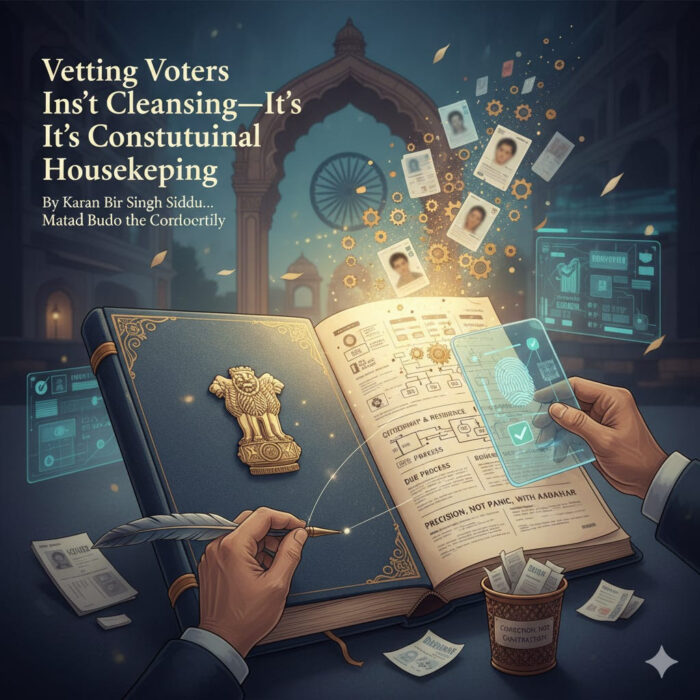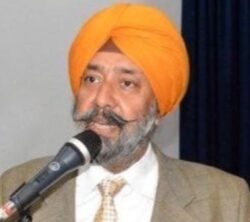 It is astounding that Mr. S. Y. Quraishi, a former Chief Election Commissioner, chooses to cast a routine, legally mandated revision of electoral rolls as a “sinister project.” This is not a purge; it is constitutional housekeeping. The Special Intensive Revision (SIR) is the instrument by which the Constitution and the Representation of the People Act, 1950, are enforced—in letter and in spirit. And despite protracted hearings and spirited challenges, the Supreme Court has not set aside this exercise. The real assault on democratic legitimacy is the opposite of what Mr. Quraishi alleges: bloated, error-stuffed rolls that invite multiple enrolments, proxy voting, and organised fraud—including the illegal inclusion of non-citizens. Calling lawful, due-process corrections “cleansing” is not principled oversight; it is fear-mongering that shields malpractice and undermines the one person, one vote ideal.
It is astounding that Mr. S. Y. Quraishi, a former Chief Election Commissioner, chooses to cast a routine, legally mandated revision of electoral rolls as a “sinister project.” This is not a purge; it is constitutional housekeeping. The Special Intensive Revision (SIR) is the instrument by which the Constitution and the Representation of the People Act, 1950, are enforced—in letter and in spirit. And despite protracted hearings and spirited challenges, the Supreme Court has not set aside this exercise. The real assault on democratic legitimacy is the opposite of what Mr. Quraishi alleges: bloated, error-stuffed rolls that invite multiple enrolments, proxy voting, and organised fraud—including the illegal inclusion of non-citizens. Calling lawful, due-process corrections “cleansing” is not principled oversight; it is fear-mongering that shields malpractice and undermines the one person, one vote ideal.
1) Citizenship and ordinary residence come first
Democracy is not merely about counting everyone who turns up; it begins with a basic qualifier: Indian citizenship, followed by ordinary residence in the constituency where one seeks to vote. The Representation of the People Act, 1950, makes this explicit. A non-citizen is disqualified from registration (Section 16), while entitlement to be registered requires being not less than eighteen years of age on the qualifying date and ordinarily resident in the constituency (Section 19). Section 20 further clarifies what “ordinarily resident” means—mere ownership of a house is insufficient, and temporary absence does not break residence.
If a person registers in multiple places—within a state or across states—he or she is subverting the law’s design of one elector, one roll, one vote. The Act prohibits such duplication: no one may be registered in more than one constituency (Section 17) and no one may be registered more than once in the same constituency (Section 18). Calling the lawful removal of duplicate, shifted, or ineligible entries a “cleansing” exercise is a category error. It is correction, not contraction.
2) Due process is built in—at multiple stages
The electoral framework gives every citizen, political party, and local representative a chance to raise claims and objections at the draft roll stage. Booth Level Officers and Electoral Registration Officers are accountable for notices, verifications, and speaking orders. Even after final publication, appeal and revision mechanisms exist for anyone wrongly left out. These safeguards are the backbone of the process. The real need is to strengthen them—through tighter timelines and better audit trails—not to delegitimise the exercise itself.
3) Precision, not panic, about Aadhaar
It is settled that Aadhaar is proof of identity, not proof of citizenship. This distinction is vital. However, Aadhaar’s biometric uniqueness can be used to detect and prevent duplicate enrolments, provided the process follows due legal safeguards and respects privacy. Aadhaar helps ensure that a person is not registered twice, thereby protecting the sanctity of the “one person, one vote” principle.
4) “Cleansing” is the wrong word—and the wrong analogy
Equating lawful, evidence-based corrections with “cleansing” (a term loaded with historical connotations of ethnic or religious persecution) is rhetorical excess. The SIR applies equally and uniformly, based solely on legal grounds: death, disqualification, migration or shift, and proven duplication. Such processes uphold equality before law. The vocabulary of atrocity politics has no place in a procedural, rights-based exercise conducted under statutory supervision.

5) Inclusion is served by accuracy—bloated rolls disenfranchise too
An inflated roll does not make democracy more inclusive; it weakens it. Duplicates and ghost entries allow impersonation and malpractice, undermining genuine voters. True inclusion lies in accuracy and balance—timely addition of new voters, correction of errors, restoration where justified, and deletion where mandated. The purpose is not to shrink the electorate but to ensure every legitimate voter’s name counts exactly once.
6) The courts haven’t struck it down—so do the work better, not less
No court has invalidated the revision framework. The constitutional remedy for errors is better implementation, not avoidance. Notices must be clear, reasons transparent, and redress swift. Where errors occur, they should be promptly corrected. Portraying the process itself as suspect only fosters cynicism and weakens institutional trust.
7) Mobility is real—so design for it without normalising duplication
India’s vast internal migration makes “shifted” entries inevitable. The solution is to simplify the portability of voter registration when citizens move, expand assisted digital channels, and run special drives in migrant zones—all while maintaining zero tolerance for duplicate entries as mandated under Sections 17 and 18 of the Act.
8) Politics should step up to scrutiny, not smear verification
The claims and objections process is an open democratic invitation for political parties and citizens alike to ensure that voter rolls remain accurate. If a deletion is wrong, it can and must be rectified. But to brand the revision exercise itself as suspect undermines a process that, in truth, protects the fairness of elections.
The Way Forward
If India is to preserve both access and integrity in its elections, the following steps are essential:
Publish reason codes and audit trails for every deletion.
Guarantee quick, local restoration for wrongful removals.
Measure success through additions, corrections, restorations, and justified deletions.
Improve portability for citizens who move between constituencies.
Use technology responsibly to eliminate duplicates while ensuring that only citizens aged 18 and above who are ordinarily resident are enrolled, as mandated by Sections 16, 17, 18, 19, and 20 of the Representation of the People Act, 1950.
Bottom line
Counting every eligible citizen once—and only once—is not “cleansing.” It is democracy doing exactly what the law commands. Mr Quraishi’s article dresses up routine, statute-backed roll revision as a moral panic, while sidestepping the plain requirements of the Representation of the People Act: citizenship, age, and ordinary residence—followed by the basic prohibition on duplicate entries. What he caricatures as a purge is, in truth, the minimum hygiene that keeps your vote from being cancelled out by a ghost name, a double enrolment, or a non-citizen slipped into the rolls.
Let’s be blunt: swollen, error-ridden rolls are not a badge of inclusivity; they are an open invitation to fraud. The only people who benefit from bloat are those who game the system—through multiple registrations, impersonation, or organised booth management. Calling the lawful removal of such entries “cleansing” is a shabby rhetorical trick: it smears a neutral, rules-based exercise with the vocabulary of atrocity to spook election authorities and confuse voters. That’s not oversight; that’s sabotage-by-semantics.
A mature democracy doesn’t flinch from maintenance. It serves notices, hears objections, restores names when officials err, and deletes names when the law so requires. That is precisely what Special Intensive Revision is designed to do. If Mr Quraishi has evidence of abuse, he should table it—not peddle innuendo about a process that applies equally to everyone and is subject to claim, objection, appeal, and swift rectification. The franchise is not protected by inflated lists and moral theatrics, but by accurate rolls and equal rules. Count every eligible citizen once—and only once—and you protect the principle Mr Quriashi’s argument quietly undermines: one citizen, one vote, no exceptions, no excuses.